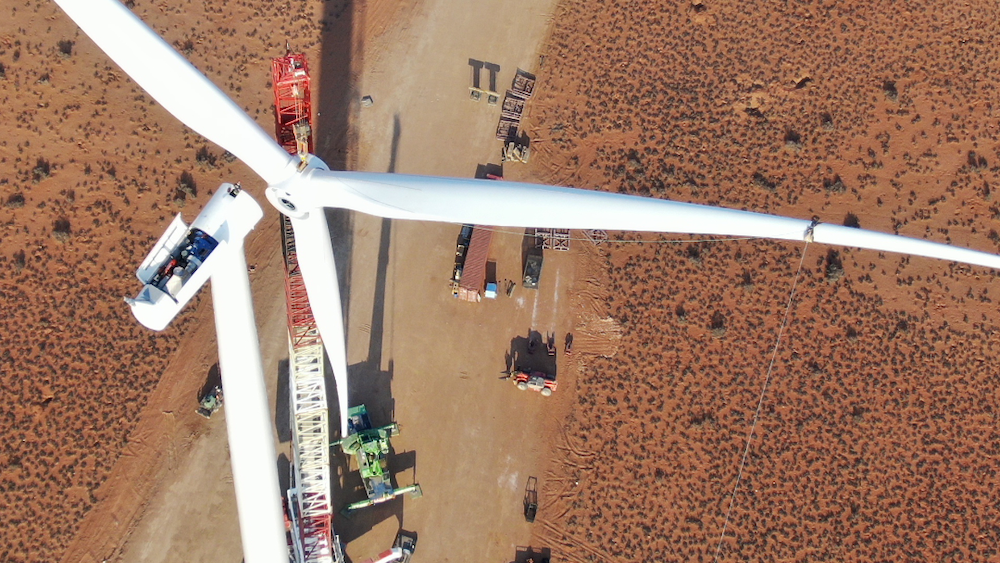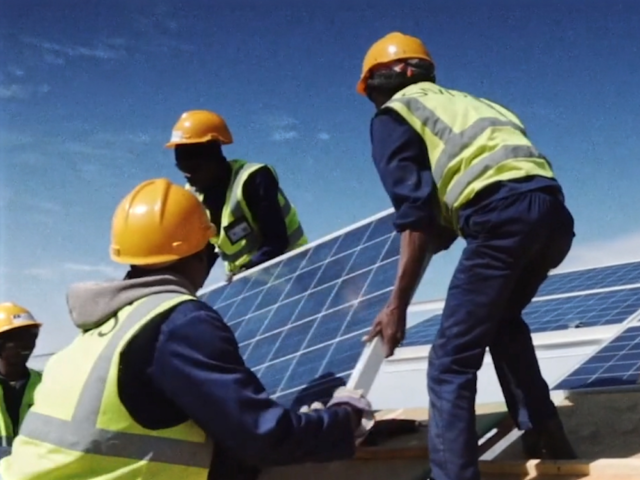Call for renewable energy to power COVID-19 recovery
Category
News
Date
28 April 2020
Location
Global

The construction of Kangnas Wind Farm in the Northern Cape has delivered local jobs and promises dividends for the wider South African economy
Mainstream is one of a hundred leading renewable energy companies that are today calling on governments to invest in the green economy as their primary route to post COVID-19 recovery.

Adam Bruce sees the IRENA Coalition for Action argument as ‘compelling’
As a member of the International Renewable Energy Agency’s Coalition for Action, Mainstream is already demonstrating in countries like South Africa how wind and solar power can deliver a just transition from fossil fuels. One that benefits not just the world’s climate, but also national economies and local communities too.
Adam Bruce, Mainstream’s Global Head of Corporate Affairs, explained: “Renewable energy can power the global recovery from COVID-19 by delivering cheap, clean and resilient energy across world markets.
“We have a real opportunity to put sustainability at the heart of the recovery, and by so doing accelerate the transition from fossil fuels to wind and solar power.
“As Coalition for Action members, Mainstream fully supports this campaign and its clear and compelling objectives.”
Read the Coalition for Action’s statement below.
Call to action in response to Covid-19: Renewable energy is a key part of the solution

As governments safeguard the health of their people and tackle the challenge of economic recovery, the IRENA Coalition for Action urges governments at all levels to leverage the progress achieved with renewable energy and not lose sight of the efforts needed to reach global climate and sustainability objectives.
Renewable energy solutions provide clean, reliable, easy to mobilise and cost-effective energy for essential services, including healthcare, water and food supply. This makes them crucial in the immediate response to COVID-19.
Furthermore, renewable energy must play a key role in economic recovery, ensuring sustainability and energy security, creating jobs and strengthening resilience to protect people’s health and welfare.
No other industry can match such impact while simultaneously reducing global climate emissions.
In the development of immediate policy responses to the COVID-19 emergency, the IRENA Coalition for Action calls on governments to:
Revisit deadlines for renewable energy projects that face contractual obligations for near-term delivery. To offset the pandemic’s impact on the labour force and the global supply chain for renewables, delayed projects should be allowed to resume under the same terms and frameworks.
- Designate the renewable energy industry and related infrastructure as a critical and essential sector. Industrial activity needs to continue along the entire supply chain to ensure essential energy services remain fully operational. Cross-border trade must be maintained for renewable energy-related goods, and renewable energy employees should be recognised as part of the essential workforce during the crisis.
- Affirm and extend policies promoting renewable energy solutions, both centralised and decentralised. To provide long-term policy certainty in this time of crisis, governments must consider affirming existing and planned support schemes, as well as continuing to implement appropriate market and policy frameworks that support grid development, storage and flexibility, and other infrastructure critical to support a higher penetration of renewable energy. Permitting and siting approvals should be fast-tracked so that the renewable energy industry can plan ahead and protect its workforce.
As governments consider the stimulus packages required for rapid and sustained economic recovery, the IRENA Coalition for Action urges them to:
- Prioritise renewable energy in any stimulus measures and commit to phasing out support for fossil fuels. Stimulus packages for any sector should include conditions to reduce emissions and accelerate the transition to a clean, low-carbon economy. Within the energy sector, fossil-fuel subsidies must be steered towards investments in low-carbon infrastructure, as well as towards research and innovation to support higher shares of renewables, particularly in end uses such as transport and heating and cooling. With higher reliance on renewables, countries and communities can benefit from more stable energy prices and greater energy independence, along with reducing emissions and fulfilling climate objectives.
- Provide public financial support to safeguard the industry and mobilise private investment in renewable energy. The crisis has had disruptive effects on private finance for renewable energy deployment. To align short-term relief measures with long-term economic and sustainability goals, governments should prioritise financial incentives for the renewable energy sector. By establishing a “no harm” principle for lending recipients, governments and financial institutions could steer key energy investments increasingly towards renewables. Furthermore, governments can provide additional lines of credit and credit guarantees, as well as special relief funds for fragile industries, such as small and medium-sized enterprises.
- Enhance the role of renewable energy in industrial policies. Governments have a historic opportunity to examine domestic industrial capabilities and supply chains, making these fit for the global shift to a clean, low-carbon economy. Along with renewable energy itself, governments can support other industries with an enabling role, such as green hydrogen, storage and digital solutions. Existing economic activities and local capabilities must be fully leveraged to maximise the socio-economic benefits of renewables, including GDP growth, job creation and improved human health.
- Revise labour and education policies to foster a just transition and help workers make the shift into renewable energy jobs. The transformation of the energy system brings vast opportunities to develop local value chains. Governments must invest in programmes to equip their societies with the knowledge and skills needed for the clean, low-carbon economy. The renewable energy sector can provide valuable support through workforce training and retraining programmes.
- Strengthen international co-operation and action to accelerate renewable energy deployment in line with global climate and sustainability objectives. COVID-19 has impacted the whole world and risks disproportionately affecting developing countries in the months and years ahead. Greater collaboration is needed between governments and across the international community to devise clear action plans, supported by appropriate funding. Long term stimulus plans could pool funding from public and private sources in order to de-risk projects and ensure access to finance for centralised and decentralised renewable energy.
The actions outlined above would support a sustainable economic recovery, make societies more resilient, and help to fulfil the objectives of the Paris Agreement and the 2030 Agenda for Sustainable Development.
In responding to the crisis, governments are currently in a position to recognise the benefits of renewables, continue building broad public support for the transformative decarbonisation of societies, and pave the way for a clean, low-carbon economy.
About the IRENA Coalition for Action
The IRENA Coalition for Action brings together leading renewable energy players from around the world with the common goal of advancing the uptake of renewable energy.
The Coalition facilitates global dialogues between public and private sectors to develop actions to increase the share of renewables in the global energy mix and accelerate the global energy transition. IRENA acts as the Secretariat of the Coalition. Read more here.
Related News
View all News
 Revisit deadlines for renewable energy projects that face contractual obligations for near-term delivery. To offset the pandemic’s impact on the labour force and the global supply chain for renewables, delayed projects should be allowed to resume under the same terms and frameworks.
Revisit deadlines for renewable energy projects that face contractual obligations for near-term delivery. To offset the pandemic’s impact on the labour force and the global supply chain for renewables, delayed projects should be allowed to resume under the same terms and frameworks.


